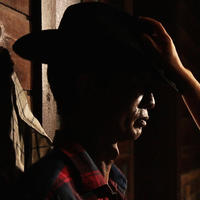 What inspired Max McGillivray to make a Western in Jackson Hole, China? The ADF recipient explains walls, Westerns and the expansive American frontier.
What inspired Max McGillivray to make a Western in Jackson Hole, China? The ADF recipient explains walls, Westerns and the expansive American frontier.
By Max McGillivray '16
Artist Development Fellow '16
Max McGillivray ’16 was a resident of Dunster House and concentrated in Visual and Environmental Studies with a secondary in History. He was awarded an Artist Development Fellowship to travel to China and create a nonfiction film about the resort town of Jackson Hole. McGillivray attended the Berlin Film Program offered by the Harvard Summer School in 2013, and submitted as his senior thesis Dulles: A Fiction, a fantasy film about the childhoods of John Foster and Allen and Eleanor Dulles. McGillivray has been a writer/videographer for the Harvard Arts Blog and an artistic intern for American Repertory Theater’s production of Finding. His future plans include graduate studies and pursuing a career in film.
-----------------------
I’m standing on the far side of a quaint pond in Jackson Hole, China, setting up a shot with my Canon 5d Mark iii. Across the pond are two actors, residents of Jackson Hole and owners of the home where we’re shooting. They perform a scene from Going Home, a Western we’ve written together. The house is a rustic, Western-style cabin. The patio is lit with LED lights, gleaming in the dark. The woman picks up a cowboy hat from the ground and gingerly places it on the man’s head before leaving the frame. I look through the camera monitor: “Cut!” A perfect take. How did this set of circumstances come to be?
 When I look around the set, the answer to this question is quite obvious: the people. Without the people of Jackson Hole, this would have never been possible. Mr. and Mrs. Shin, the homeowners, act in the yearly theatrical productions in Jackson Hole, but they’ve never performed on camera. They’ve given me two full days of their time to act and be interviewed. My crew is also made up of amateurs, but that doesn’t deter their enthusiasm. We have Mr. Huo – the young publications officer at Jackson Hole – on sound. He’s arranged my stay at Jackson Hole the past three weeks, moving me from room to room whenever there’s a vacancy. Another member of the community staff – Mr. Chi – has taken me to lunch and dinner every day. And loads of other residents and community employees have been on hand to help, as well. The hospitality is more than I could have asked for.
When I look around the set, the answer to this question is quite obvious: the people. Without the people of Jackson Hole, this would have never been possible. Mr. and Mrs. Shin, the homeowners, act in the yearly theatrical productions in Jackson Hole, but they’ve never performed on camera. They’ve given me two full days of their time to act and be interviewed. My crew is also made up of amateurs, but that doesn’t deter their enthusiasm. We have Mr. Huo – the young publications officer at Jackson Hole – on sound. He’s arranged my stay at Jackson Hole the past three weeks, moving me from room to room whenever there’s a vacancy. Another member of the community staff – Mr. Chi – has taken me to lunch and dinner every day. And loads of other residents and community employees have been on hand to help, as well. The hospitality is more than I could have asked for.
I had no idea what to expect when I arrived in Jackson Hole, China – a community of some 1,500 families living in Western-style homes two hours north of Beijing. I had seen some articles, I had read some pamphlets but nothing answered the pervasive question in my mind since first hearing of this frontier community: Why? What could possibly be the appeal of cowboy hats and log cabins to people living in the Far East? I had to go see for myself. I decided to document my experience, while I attempted to make a short Western.
Looking at this scene, it dawned on me why this community is so popular. Residents don’t come to Jackson Hole so much for the setting as for the spirit. “In Beijing, you don’t know your neighbors,” one resident explained over a hearty dinner of beef and veggie dumplings. “But here, there are no walls. And fences are short. We like spending time with each other.”
Indeed, this whole project looked to be a total failure until I met one resident at a painting class. She had worked in Chinese television and thought the project was a fun use of her time. With her assistance, I found actors and a crew and got my film made in two days.
“We like doing this,” she said. “That’s why we’re here.”
As I left Jackson Hole, the question lingered: Why the Wild West? Yet, I’m not so indignant on finding an answer. The frontier represented opportunity for millions of Americans between the time of the Civil War and the turn of the 20th century. But for the rest of us, it’s a delusion played out on silver screens and cigarette cartons. We may have a distorted image of the Wild West. But that image excites us and it gets us to believe in lofty goals – like building a community of friends. Or shooting a Western in China.